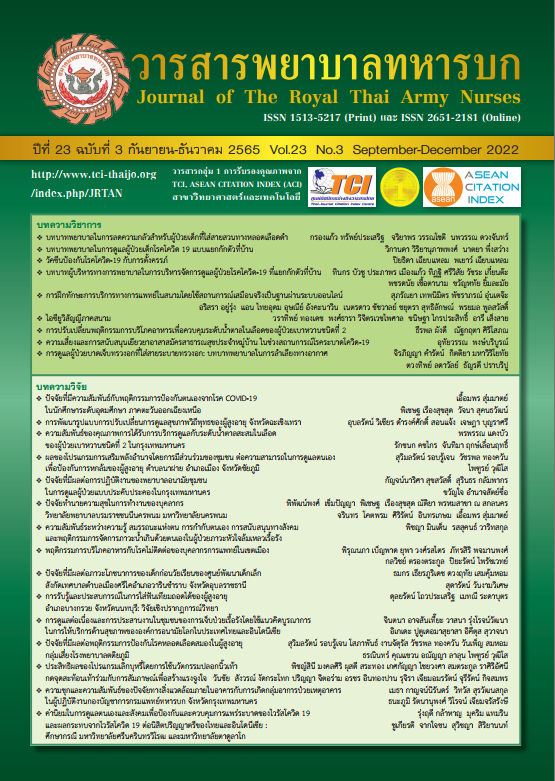The Effects of Non-pharmacological Program to Manage and Prevent Acute Delirium in Critically Ill Surgical Patients
Keywords:
acute delirium, non-pharmacological management, critically ill surgical patientsAbstract
This quasi-experimental research aimed to study the effects of non-pharmacological management and prevention program for acute delirium in postoperative critically ill patients. The participants were adult patients aged over 18 years old and admitted to two surgical intensive care units (3IC and SDICU 51), Faculty of Medicine Ramathibodi Hospital, Mahidol University. Data were collected from 100 postoperative critically ill patients. Fifty of the participants in the experimental group received non-pharmacological management and prevention program, while another 50 of the participants in the control group received usual care. The research instruments were the non-pharmacological management and prevention program for acute delirium and the Richmond agitation sedation scale assessment. Data were analyzed using descriptive and Chi-squares statistics. The results revealed that the program of non-pharmacological management and prevention for acute delirium had reduced the incidence of acute delirium at the significant level of .05 (p = .028) and incidence of unplanned extubation at the significant level of .05 (p = .041).
Downloads
References
Oh ES, Fong TG, Hshieh TT, Inouye SK. Delirium in older persons: advances in diagnosis and treatment. JAMA. 2017;318:1161-74.
American Psychiatric Association. Diagnostic and Statistical Manual of Mental Disorders. 5thed. Washington, DC: American Psychiatric Association; 2013.
Lumyong T., Jitpanya C. Factors related to delirium in ICU patients with mechanical ventilators. Thai Journal of Cardio-Thoracic Nursing. 2012;23(1):19-30. (in Thai).
Lee H, Ju JW, Oh SY, Kim J, Jung CW, Ryu HG. Impact of timing and duration of postoperative delirium: a retrospective observational study. Surgery. 2018;S0039-6060(18)30035-7.
Ganai S, Lee KF, Merrill A, et al. Adverse outcomes of geriatric patients undergoing abdominal surgery who are at high risk for delirium. Arch Surg. 2007;142(11):1072-78.
Chaiwat O, Chanidnuan M, Pancharoen W, et al. Postoperative delirium in critically ill surgical patients: incidence, risk factors, and predictive scores [published correction appears in BMC Anesthesiol. 2019;19(1):39.
Ngamkala T, Malathum P, Krairit O. Incidence and risk factors of acute confusional state in hospitalized older patients. Rama Nurs J. 2018; 24(2):137-49. (in Thai).
Tilouche N, Hassen MF, Ali HBS, Jaoued O, Gharbi R, El Atrous SS. Delirium in the intensive care unit: incidence, risk factors, and impact on outcome. Indian J Crit Care Med. 2018;22(3): 144-49.
Ashraf A, Hashmi M, Raza A, Salim B, Faisal Khan M. Incidence, risk factors and outcome of delirium in a surgical intensive care unit of a tertiary care hospital. Qatar Med J. 2020; 2019(2):62.
Kamdar BB, Yang J, King LM, et al. Developing, implementing, and evaluating a multifaceted quality improvement intervention to promote sleep in an ICU. Am J Med Qual. 2014;29(6): 546-54.
Ono H, Taguchi T, Kido Y, Fujino Y, Doki Y. The usefulness of bright light therapy for patients after oesophagectomy. Intensive Crit Care Nurs. 2011;27(3):158-66.
Schweickert WD, Pohlman MC, Pohlman AS, et al. Early physical and occupational therapy in mechanically ventilated, critically ill patients: a randomised controlled trial. Lancet. 2009;373(9678):1874-82.
Smith CD, Grami P. Feasibility and effectiveness of a delirium prevention bundle in critically ill patients. Am J Crit Care. 2016;26(1):19-27.
Chutchawan N, Untaja P, Yuroong A. The nurses role in delirium management in older persons. Journal of The Royal Thai Army Nurses. 2018;19(2): 103-10. (in Thai).
Ely EW, Truman B, Shintani A, et al. Monitoring sedation status over time in ICU patients: reliability and validity of the Richmond Agitation-Sedation Scale (RASS). JAMA. 2003; 289(22):2983-91.
Kaveenuntachai D, Akkarawongvisit C, Jaiboon S. The prevention and management of delirium in hospitalized older adults. Kuakarun Journal of Nursing. 2020;27(1):162-74. (in Thai).
Downloads
Published
How to Cite
Issue
Section
License
Copyright (c) 2023 Journal of The Royal Thai Army Nurses

This work is licensed under a Creative Commons Attribution-NonCommercial-NoDerivatives 4.0 International License.
บทความหรือข้อคิดเห็นใดใดที่ปรากฏในวารสารพยาบาลทหารบกเป็นวรรณกรรมของผู้เขียน ซึ่งบรรณาธิการหรือสมาคมพยาบาลทหารบก ไม่จำเป็นต้องเห็นด้วย
บทความที่ได้รับการตีพิมพ์เป็นลิขสิทธิ์ของวารสารพยาบาลทหารบก
The ideas and opinions expressed in the Journal of The Royal Thai Army Nurses are those of the authors and not necessarily those
of the editor or Royal Thai Army Nurses Association.






